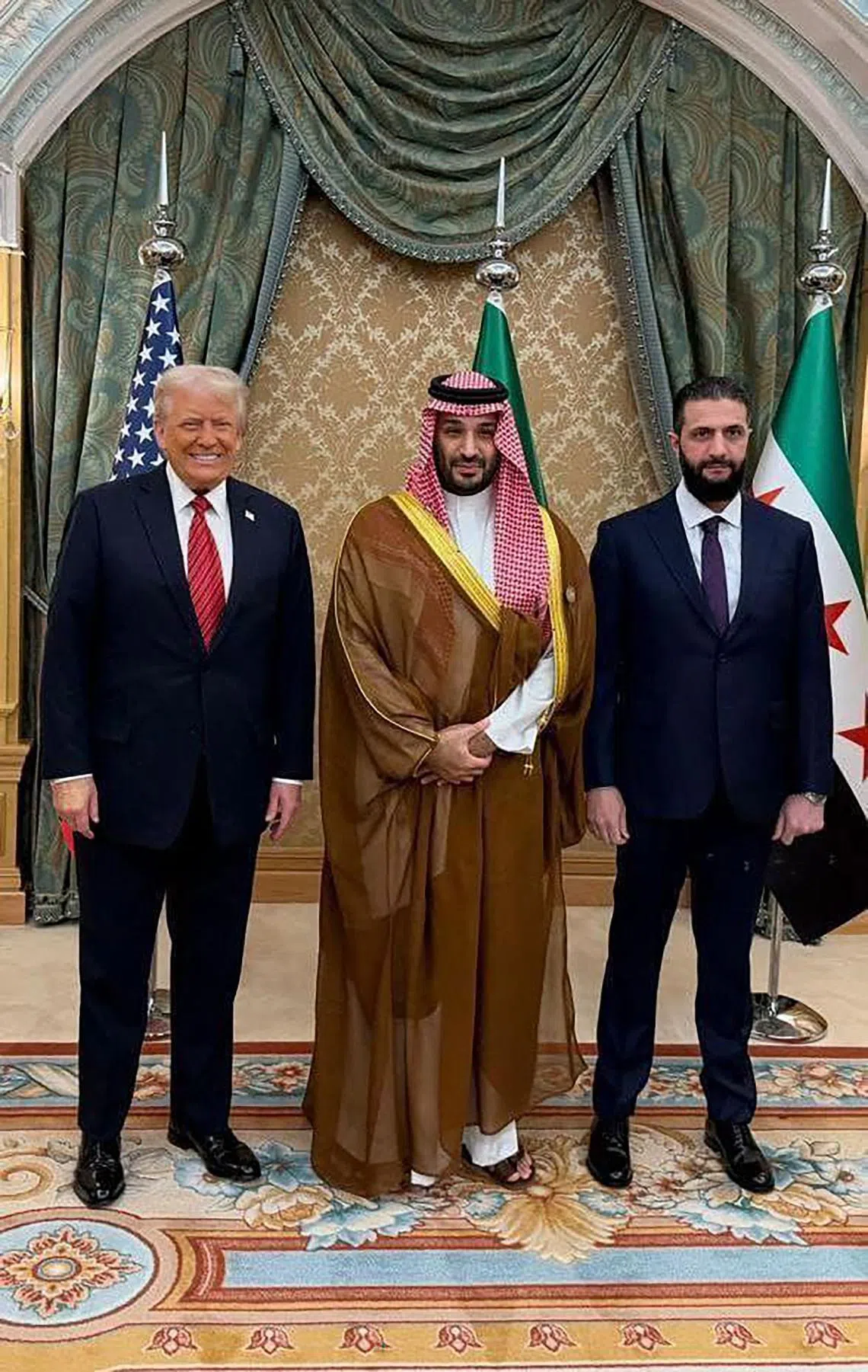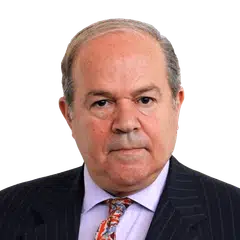News analysis
Of pomp and scandal: Trump brings simple answers to complex issues in waltz through Middle East
Sign up now: Get ST's newsletters delivered to your inbox

US President Donald Trump and Saudi Crown Prince Mohammed Bin Salman (right) meeting Syria's interim President Ahmed al-Sharaa on May 14 in Riyadh.
PHOTO: REUTERS
Follow topic:
LONDON – US President Donald Trump’s tour of the Middle East is a classic mix of pomp and scandal.
The coverage of the trip in the American media was dominated by the outrage among US lawmakers over Mr Trump’s apparent intention to accept a Qatari gift of a Boeing 747-8 executive airliner
“The corruption is brazen,” alleged Senator Adam Schiff of California, who led the first impeachment case against Mr Trump back in 2019.
Yet beyond this controversy and the predictable US media reporting of fabulously rich Gulf sheikhs with gold palaces in the sand, the reality is that the President’s trip is a substantial diplomatic engagement that will have a significant and long-lasting impact on the region.
Mr Trump is genuinely liked and admired in the Gulf. Unlike his immediate predecessor Joe Biden, who came to office vowing to shun Saudi Arabia and its leaders – only to discover that he needed both – Mr Trump has embraced the region’s pro-Western monarchies from the start without hesitation.
The people of the region’s most powerful kingdom “think of the American President as a straight-shooting businessman – someone who talks of interests and not values, who won’t lecture them about human rights and who shares their own distaste for woke progressive dogma”, admitted Mr Michael Ratney, America’s top envoy to Saudi Arabia during the Biden presidency, in an op-ed published in the New York Times.
Of course, the effusive reception Mr Trump received in Gulf capitals was carefully choreographed, but it was also genuine.
A master in working the crowds, he showered the people of the region with praise – not something the Arabs of the Gulf were accustomed to getting from previous US leaders.
Standing in front of a giant Saudi flag in Riyadh, the nation’s capital, on May 13, Mr Trump not only hailed Crown Prince Mohammed bin Salman
“They did it on their own,” he said in remarks that are now constantly replayed on local government media networks.
The region’s leaders find it easier to deal with an American billionaire who can offer major political concessions in return for multibillion-dollar business deals and who prefers simple answers to complicated problems.
One such sudden answer to a thorny Middle Eastern problem was Mr Trump’s decision to meet Syria’s interim President Ahmed al-Sharaa
Until recently, Mr Sharaa, who came to power in December 2024
And the Hayat Tahrir al-Sham militia that he leads continues to be listed by the US as a terrorist organisation.
But after a brief encounter with the Syrian leader in the Saudi capital lasting just under 40 minutes, Mr Trump not only announced that he was immediately lifting all US economic sanctions imposed on Syria for more than a decade but also praised Mr Sharaa as a “young, attractive guy” with a “strong past” and an “extraordinary opportunity”.
Mr Sharaa, in turn, hailed Mr Trump’s decision as “a historic and courageous decision, which alleviates the suffering of the people, contributes to their rebirth and lays the foundations for stability in the region”.

(From left) US President Donald Trump, Saudi Crown Prince Mohammed bin Salman and Syria’s interim President Ahmed al-Sharaa in Riyadh on May 14.
PHOTO: AFP
Mr Trump’s about-turn on Syria
The new Syrian government is beset by domestic problems and has yet to prove that it is sincere in its promises to govern the country for the benefit of all its multi-ethnic people.
Yet, none of this can happen as long as Syria’s economy remains crippled by sanctions. European powers, led by France, have argued for months that the sanctions should be lifted. However, as long as the US sanctions remained in place, no European company dared to trade with Syria.
Now that obstacle has been removed in a single stroke to the jubilation of ordinary Syrians, who took to the streets to express their joy.
The decision is a major victory for the Saudi Crown Prince because it signals his ability to influence Mr Trump’s policies, and cements Saudi Arabia’s reputation as the Middle East’s main fixer.
At the same time, Mr Trump’s abrupt policy turn is a serious blow to Israel, which has maintained a deeply hostile attitude towards the new Syrian government and has launched repeated military incursions into Syrian territory.
The US President also pleased his hosts by adopting a restrained approach to Iran. While the Gulf states remain wary of Iran’s nuclear intentions, they fear a military confrontation between Iran and the US much more.
The US has continued to tighten pressure on Iran. On May 14, its State Department slapped sanctions on companies and individuals
During his trip, Mr Trump vowed that he would never allow Iran to obtain a nuclear weapon but continued to emphasise his commitment to diplomatic efforts.
“There are only two courses,” he said. “Friendly and non-friendly, and non-friendly is a violent course. I don’t want that.”
In return, his Arab hosts did not press him too much on the question of Gaza.
The plight of the Palestinians remains uppermost in the Arab leaders’ minds. Yet, they are all aware of the cooling relations between Mr Trump and Israel,
The White House’s claims that the trade deals signed by the President with Qatar
Nevertheless, Mr Trump’s tour of the Middle East was undoubtedly a victory lap for him and a game-changer for the region – even if the Qatari-gifted jet ultimately does not end up serving as the new Air Force One.
Jonathan Eyal, who is based in London and Brussels, writes on global political and security matters.


